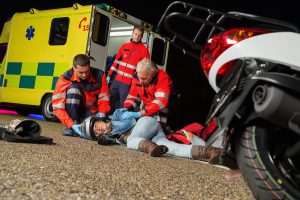The Most Common Motorcycle Accident Injuries Are Far More Serious Than Other Traffic Accidents
 Michael Babboni
Motorcycle Accidents
Thanks to Florida's warm weather, it has become a popular place for the motorcycle lovers and enthusiasts alike. There is nothing like the sense of power and independence you feel when your riding a motorcycle. Sadly, riding a motorcycle greatly increases your chances of being in an accident. Motorcycle accidents are often one of the most severe of all motor vehicle accidents.
Michael Babboni
Motorcycle Accidents
Thanks to Florida's warm weather, it has become a popular place for the motorcycle lovers and enthusiasts alike. There is nothing like the sense of power and independence you feel when your riding a motorcycle. Sadly, riding a motorcycle greatly increases your chances of being in an accident. Motorcycle accidents are often one of the most severe of all motor vehicle accidents.Unlike a driver or passenger of a car, there is very little protecting the biker from the full impact of the accident. As you can imagine, the injuries sustained in a motorcycle accident are quite severe and takes a significant amount of medical care and treatment to heal properly. Many leave the biker disabled for the rest of their life.
Here are just a few of the injuries you could be looking at after a motorcycle accident.
Road Rash
Any injury sustained from sliding across the pavement after a motorcycle accident is called road rash. Usually, your clothing and gear will be able to protect your skin from the road during an accident. However, clothing may not be enough to protect from road rash if the material is thin and easily scraped away.
Road rash is more than just a cut or bruise, it is a serious injury that can lead to more permanent damage such as an infection or nerve damage. Occasionally, the road rash is so severe that it allows bone to show. To avoid road rash, make sure your covered in thick protective gear. Leather is especially good at guarding against road rash.
Head Injury
Your skull protects one of the most important parts of your body, your brain. However, your skull is not as strong as you think. The impact of a motorcycle accident can often leave it cracked and will damage the brain inside. Luckily, helmets are strong enough to keep your skull and brain safe from harm. There are many accident survivors that owe it to their helmets.
Sadly, not all motorcyclists actively wear their helmets and end up seriously injuring their brain as a result. This leads to a condition called Traumatic Brain Injury or TBI. Though TBI can be mild, this is often not the case for bikers. Many motorcyclists with TBI are permanently disabled from their injury or die soon after. Neck injuries are also fairly common, but are closely related to head injuries and commonly result in paralysis.
Muscle Damage
Much like road rash, muscle damage mostly occurs to areas of your body with exposed skin or with only a very thin layer of protection. Muscle damage is typically permanent, severe, and disabling. It can even result in paralysis in worst case scenarios. The best way to prevent muscle damage is by wearing thick protective gear with little to no exposed areas of skin.
Muscle damage can sometimes include damage to the eardrum as well. The loud sound of the bike and other sounds increases the chances of bursting an eardrum or becoming deaf. This is a risk that can happen outside of an actual accident and can easily be avoided with a helmet or ear plugs.
Arm Injury
Arm injuries, also known as Biker's Arm, is a condition that occurs after the initial impact of the accident. When your in a car accident, the seat belt or outer shell of the car protects you from flying out into the street. However, when your in a motorcycle there is little to nothing that keeps you from doing so.
In the event of an accident, it is human instinct to put one's arms around or in front of oneself to lessen the impact. Though it does help protect more vital areas of the body, it does mean that the arms get the full impact. This can commonly cause broken bones, muscle damage, nerve damage, and even missing limbs in some cases.
Leg Injury
Though it is a pretty common injury, leg injuries are typically non-fatal and refer to both the legs, feet, and knees. Most leg injuries are large cuts, scrapes, road rash, and bruising. Broken, shattered or fractured bones are also pretty common as well. However, they can become permanently disabling in severe cases or if you hesitate to seek medical attention.
Most motorcycle accidents are not caused by the rider, but by others who did not notice the rider nearby. Sadly, this is why motorcycle accidents commonly lead to personal injury and wrongful death cases.
If you find yourself injured after a motorcycle accident, don't hesitate to seek financial compensation for your injuries. Our professionals are eager to help you get the help and assistance you need to recover.
